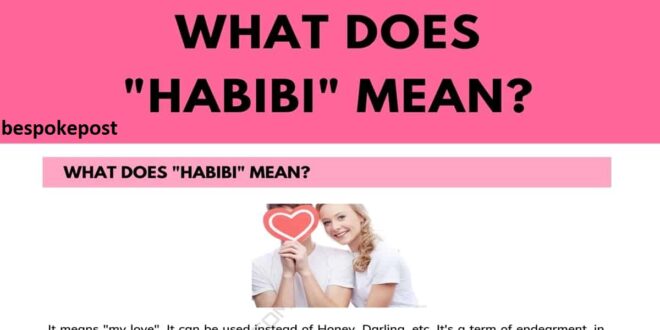In the rich tapestry of Arabic language and culture, “Habibi” is a term that often captures the hearts of those who encounter it. Whether seen in music, movies, or casual conversations, “Habibi” is a word that resonates with warmth and affection. But what exactly does “Habibi” mean, and how is it used across different contexts? This guide will delve into the meaning of “Habibi,” its cultural significance, and how it has transcended its linguistic origins to become a global expression of endearment.
What Does “Habibi” Mean?
“Habibi” (حبيبي) is an Arabic word that translates to “my beloved” or “my dear.” It is derived from the root word “حب” (hubb), which means “love.” The term is widely used in various Arabic-speaking countries and has made its way into popular culture around the world.
1. Literal Translation
- Literal Meaning: “Habibi” directly translates to “my beloved” or “my darling.” It is a term of endearment that conveys deep affection and love.
2. Usage in Different Contexts
- Personal Relationships: In intimate or familial relationships, “Habibi” is often used to express love and affection between close friends, family members, and romantic partners.
- Casual Conversations: It can also be used more casually to address someone affectionately, even if the relationship is not deeply personal.
The Cultural Significance of “Habibi”
1. Arabic-speaking Countries
In Arabic-speaking countries, “Habibi” is a common term used in everyday conversation. It reflects the cultural value placed on personal connections and warmth in interactions.
- Family and Friends: Within families and among friends, “Habibi” is used to strengthen bonds and express caring sentiments.
- Romantic Contexts: In romantic relationships, it serves as an endearing way to address a partner.
2. Global Popularity
“Habibi” has transcended its original linguistic and cultural boundaries, gaining popularity in various parts of the world.
- Music and Media: The term has been popularized in songs, films, and social media, contributing to its global recognition.
- Cultural Exchange: Through cultural exchange, “Habibi” has become a symbol of warmth and affection, appreciated across different cultures.
How to Use “Habibi” Appropriately
1. In Personal Relationships
- Romantic Partners: Use “Habibi” to express love and tenderness with a romantic partner.
- Family and Friends: Address close friends and family members with “Habibi” to show affection and endearment.
2. In Casual Settings
- Friendly Conversations: In casual conversations, “Habibi” can be used to address someone in a friendly and affectionate manner, even if you are not deeply acquainted.
3. Understanding Context
- Cultural Sensitivity: Be aware of the cultural context in which you use “Habibi.” While it is a term of endearment, ensure that its usage is appropriate for the relationship and setting.
Frequently Asked Questions (FAQs)
1. Is “Habibi” used only in romantic contexts?
No, “Habibi” is not exclusive to romantic contexts. While it is often used to address a romantic partner, it is also commonly used among friends and family to express affection and warmth.
2. Can “Habibi” be used with strangers?
Using “Habibi” with strangers may come across as overly familiar or informal, depending on the context. It is generally best reserved for people you have a personal connection with.
3. How do you respond if someone calls you “Habibi”?
If someone calls you “Habibi,” you can respond with warmth and gratitude, acknowledging their affection. Depending on your relationship with the person, you might reciprocate with a similar term of endearment.
4. Are there any variations of “Habibi”?
Yes, variations include “Habibti” (حبيبتي), which is used to address females and translates to “my beloved” in the feminine form. There are also regional variations and slang adaptations in different Arabic-speaking countries.
5. How has “Habibi” been popularized outside the Arab world?
“Habibi” has gained global recognition through music, films, and social media. Its use in popular culture has introduced it to audiences worldwide, making it a familiar term of endearment beyond Arabic-speaking communities.
Read more Red Dunks: Why These Iconic Sneakers Are a Must-Have for Every Style Enthusiast
Conclusion
“Habibi” is a term that carries deep affection and warmth, transcending its Arabic origins to become a cherished expression of love and endearment in various cultures. Whether used in intimate relationships, casual conversations, or global media, “Habibi” reflects the universal desire for connection and kindness. By understanding its meaning and cultural significance, you can appreciate and use “Habibi” in a way that honors its rich heritage and emotional impact.

